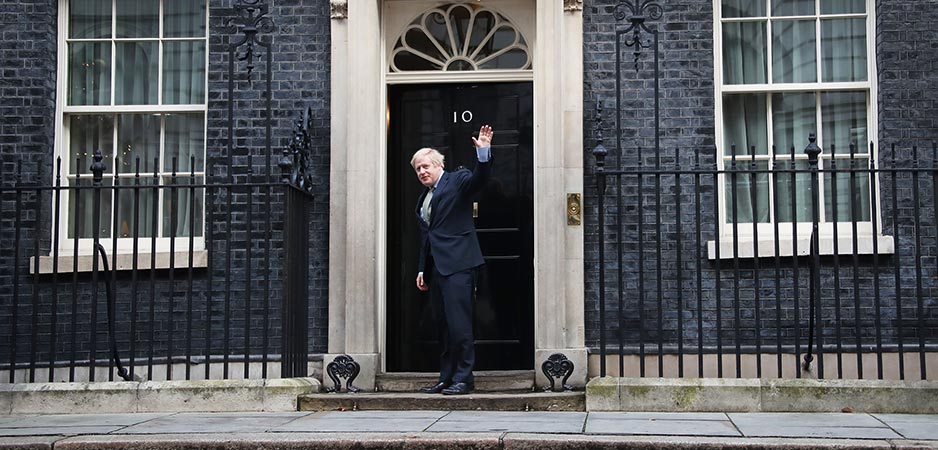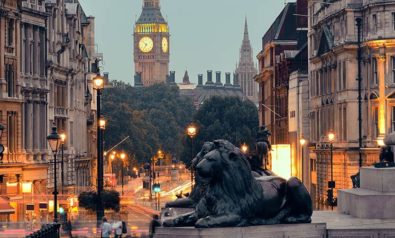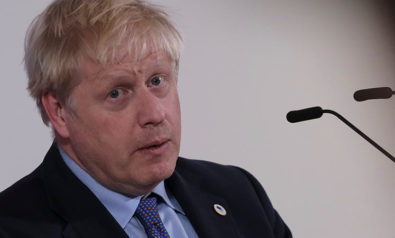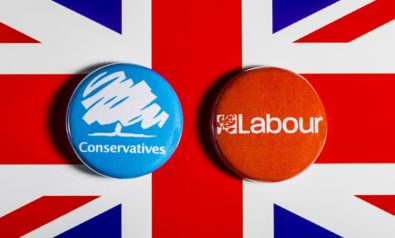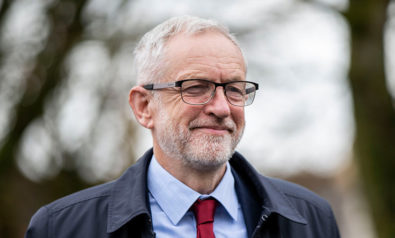British Prime Minister Boris Johnson has given Jeremy Corbyn a good old-fashioned thumping. The Conservatives won 365 seats out of 650 in Parliament, gaining 47. They smashed the “red wall” of solid Labour seats in northern England. The Johnson-led Conservatives achieved the highest vote swing since World War II. In a typical British irony, old mining towns reposed their trust in an Old Etonian over a dyed-in-wool socialist.
360° Context: Britain Faces a Historic Election
On December 10, this author took the view that the Tories would be back in power because they seemed to have the most loyal flock. That view has been vindicated resoundingly.
The Labour Party is in complete disarray. Corbyn has been weighed, measured and found wanting. While he has promised to step down, he has failed to resign unlike his predecessors. In defeat, a full-scale civil war has broken out in the Labour Party. In the words of Ian Murray, the only Labour MP from Scotland, “This party must listen and this party must respond or this party will die.”
From New Labour to the Left
To be fair, Labour has problems that go beyond Corbyn. The New Labour that Tony Blair and Gordon Brown created lost its sheen with the Iraq War of 2003 and the global financial crisis of 2007-08. Both Blair and Brown were Margaret Thatcher’s political children. One of them emulated her Falklands adventure by taking the UK into intervention in Kosovo, Sierra Leone and Iraq. The other followed the Iron Lady’s “Big Bang” reforms with “light touch” regulation of the City of London. Both Iraq and light touch ended up in disasters.
Many in the Labour Party were deeply uncomfortable with Blair’s imperial militarism and Brown’s financial capitalism. They saw both these leaders making a Faustian pact with Mephistopheles for the proverbial kiss with Helen. They were both seduced by power and reneged on principles that Labour once held dear. Once Brown lost in 2010, the old guard mounted a comeback. First, Ed Miliband beat his Blairite brother, David, to become the party leader. Then, Corbyn won the Labour leadership election in 2015, marking a major lurch to the left.
Corbyn was an unlikely leader of the Labour Party. In the Blair and Brown years, Labour had turned staunchly European. Yet it is important to remember that Labour campaigned against joining the European Economic Community (EEC) in the 1975 referendum. Thanks to the Maastricht Treaty, the EEC became the European Union in 1993. Corbyn was a part of that Labour campaign even as Thatcher and the Tories argued to join the EEC. It took Neil Kinnock to modernize Labour and turn it into a pro-European party.
Yet euroskeptic elements remained. Corbyn was one of them. Suspicions abound that he remains opposed to the EU and is a closet Brexiteer. Corbyn certainly did not campaign to “remain” in the European Union with much energy or enthusiasm in 2016. In the general election on December 12, 2019, his position on Brexit was a fudge that tried to reconcile the tension between Blairites who have sworn an oath of fealty to the EU and working-class supporters who voted for Brexit. Faced with the crystal clarity of Johnson’s message “get Brexit done,” Corbyn’s fudge melted spectacularly.
Corbyn’s authoritarian leadership style, lack of nimbleness and terrible public speaking ensured that he was not seen as prime ministerial material. Accusations of anti-Semitism dogged the Labour Party under his tenure. Corbyn’s front bench lacked both experience and talent. Even traditional Labour voters lost faith in their party’s leadership and switched sides to the once-hated Tories. Unless the Labour Party elects a charismatic leader who unifies warring factions and crafts a modern message, it will spend a decade or more in opposition.
The Rest of the Opposition
The Liberal Democrats cast off with great hopes during the election. Unfortunately, their ship has rammed into the rocks. Young leader Jo Swinson lost her own seat and promptly resigned. She lacked the intellectual ballast or silver tongue to be a match for Johnson, and her claim to be a prime ministerial candidate smacked of hubris. Swinson’s bet on opposing Brexit and reversing the result of the 2016 referendum did not cut ice with voters. The Liberal Democrats did split the vote and helped the Tories achieve victory. This led columnist Simon Jenkins to argue that the party is “ an anachronistic political spoiler” that “should disband.” On current trends, the Liberal Democrats are destined to stay in the doldrums for the next few years.
This election was also notable for the reduced relevance of the Democratic Unionist Party (DUP) and Nigel Farage’s Brexit Party. The Conservatives no longer need the former in the House of Commons and have sucked oxygen from Farage’s mob. The DUP’s loss to unionists and republicans has long-term implications. A majority in Northern Ireland has voted for parties that favor union with Ireland, putting the unity of the UK at risk.
In fact, television programs and numerous pundits are pontificating about the break-up of the UK. The Scottish National Party (SNP) won 48 of the 59 seats in Scotland. If Johnson has the mandate in England, Nicola Sturgeon has the backing of Scotland. During the 2014 Scottish independence referendum, the UK was part of the EU. During the Brexit referendum, Scots voted to remain in the EU. Sturgeon is making a credible argument that Scotland “cannot be imprisoned” in the UK “against its will.” She has sounded the clarion call for another independence referendum by declaring that “the will of the Scottish people cannot be ignored.” The union of England and Scotland of 1707 vintage is certainly at risk.
And the Tories?
What is not at risk is the future of the Conservative Party. The natural party of power has reinvented itself yet again. Some members of Johnson’s team are bullish about life outside the EU. They are already plotting to attract the insurance market from Hong Kong to London as the Asian metropolis suffers from incessant protests that are making business onerous if not impossible. They want London to be a Singapore-style safe haven for capital from around the world unconstrained by EU rules.
Like Singapore, they want the UK to invest in public infrastructure, state schools and the National Health Service (NHS). Apart from a supply-side boost, there is a demand-side policy too. Brexit will enable Tories to ease pressure on public services and scarce resources by curbing immigration. Dominic Cummings, the Svengali figure in Johnson’s team, is now the dominant intellectual force in British politics. After shifting politics to the right, he plans to shift economic policy to the left and steal Labour’s clothes, leaving the opposition naked for the next election or two.
Andrew Sullivan, a former president of the Oxford Union who knew Johnson in those days, recently wrote an article on the prime minister’s blundering brilliance. The Pied Piper has managed to “engage and co-opt rather than dismiss and demonize” the Brexit discontent. In a little-watched video, Cummings spoke about the strategy the Tories followed to do so. As per Johnson’s strategist, the EU-project was “driving the growth of extremism” and Brexit will “drain the poison of a lot of political debates.” All four of Cummings’s grandparents served in World War II. For all his faults, this shadowy figure genuinely cares about schools, hospitals and the working class.
Johnson might be a cavalier but, as Sullivan observes, he can connect with people from other backgrounds. He was successful as mayor of London and won a second term in a city with a natural Labour majority. Unlike David Cameron and George Osborne, Johnson never believed in austerity and opposed “Kosovo-style social cleansing” of the poor in London. As prime minister, he is promising higher public spending and lower taxes while acting tough on crime, terrorism and immigration. In fact, Cummings and Johnson might be about to move the Tories and the UK away from its Thatcherite roots. If they do so successfully, the UK might have a good shot at staying united.
What Happens to the EU?
Make no mistake, Johnson’s emphatic victory is terrible news for the European Union. The eurozone economy is in trouble. It is experiencing anemic growth and high unemployment. Productivity is stubbornly refusing to rise. In fact, the contradictions of a single currency are threatening to derail the entire European project. There is a strong argument to be made that Greece and Germany should not have the same currency. They are far too different from one another. The same monetary policy for the two countries does both of them a disservice, exacerbating existing imbalances.
Even as the euro currency creates new tensions, the sovereign debt crisis is straining common bonds. The Europeans and the International Monetary Fund might have bailed out Greece with its economy a little over $300 billion. Italy with its economy of about $2 trillion and a debt-GDP ratio of more than 130% is too big for anyone to bail out. German taxpayers are going to balk at the bill.
Instead of honestly tackling its financial crisis, Europe has elected to take the “extend and pretend” approach of prolonging payment timetables and believing in the fiction that countries like Greece or Italy will pay back their debts. Instead, Europe has been practicing “socialism for the financial sector and austerity for everyone else.” Naturally, this is causing resentment. In Italy, Matteo Salvini rose to power on the basis of public anger against Brussels.
Countries such as Poland and Hungary are also rocking the EU boat. Even in France and Germany, euroskeptic parties are on the rise. The democratic deficit in Brussels does not help. Neither does the red tape. While some European officials are outstanding, many are utterly inefficient if not corrupt. Brussels is simply too removed from Marseille or Munich and Europeans still do not feel an emotional connection with it.
If Johnson and Cummings pull off a successful Brexit, centrifugal tendencies in Europe will increase. Italy might join the UK in opting to leave the EU and so might other countries. If that happens, Johnson would be a modern-day Henry VIII. He would have taken back control from Brussels just as the portly 16-century king threw off the yoke of Rome. Brexit might seem like yet another case of British pluck, foresight and cunning.
Of course, Europeans could come together to form a closer union. A fiscal union might emerge to complement its monetary union. Structural reforms might resolve its contradictions. Yet that seems unlikely. In the short run at least, the EU will suffer.
What Happens to the US?
In the US, commentators often compare Johnson to President Donald Trump. Johnson’s victory has sent shivers down liberals and enthused conservatives. Both are drawing their own lessons.
Roger Cohen sounded the bugle in The New York Times and warned that Trump could win in 2020. In a rambling piece, he called Brexit “a national tragedy” and asserted that the triumph of emotion over reason in the age of Facebook queers the pitch for the likes of Johnson and Trump. Cohen’s comparison is superficial and does Johnson a disservice. Johnson may be a lying scoundrel, but he is no Trump.
Jon Sopel of the BBC also got in on the act. He warned Democrats against choosing Bernie Sanders or Elizabeth Warren who might be American counterparts of Corbyn. He pointed out that Blair won a third term despite voters seeing him as “smarmy, George W. Bush’s poodle, in the pocket of big business – and a war criminal.”
Corbyn lost despite promising more money for NHS, nationalization of key industries and free broadband for everyone. The fact that working-class workers turned their backs on Labour in a class-divided society is a key lesson for Democrats. The Green New Deal and the Medicare for All plan might smack of socialism. Bigger government and higher taxes are not easy sells in Anglo-Saxon lands. In the US, socialism is a dirty word and Democrats could gift the election to Trump by flirting with it.
On Fox News, Cal Thomas argued that Johnson’s victory is similar to Thatcher’s triumph in 1979. It presages a second term for Trump just as the “Iron Lady” paved the path for Ronald Reagan. The news headlines, social media chatter and liberal outrage will be trumped by a booming economy, soaring stock markets and healthy job numbers. In 2016, the vote for Brexit was followed by a mandate for Trump.
The 2020 presidential election is some way off and these commentators might be premature in their predictions. The immediate item on the agenda for both countries is a US-UK trade deal. Johnson and Cummings plan to wrap up trade deals around the world and strengthen their hand against the EU. They will be bending their backs to get a trade deal done by next year.
They might have an ally in the White House. Trump is embroiled in impeachment proceedings. He has been a vocal supporter of Brexit and an opponent of the European project. A trade deal with the UK will take away attention from the proceedings and spite EU bigwigs. In an election year, it would make for good political theater. Waving a “great trade deal” around might bolster Trump’s image in the eyes of his supporters. Anglo-Saxon democracies have much in common and Johnson’s victory will inevitably affect politics across the pond.
The views expressed in this article are the author’s own and do not necessarily reflect Fair Observer’s editorial policy.
Support Fair Observer
We rely on your support for our independence, diversity and quality.
For more than 10 years, Fair Observer has been free, fair and independent. No billionaire owns us, no advertisers control us. We are a reader-supported nonprofit. Unlike many other publications, we keep our content free for readers regardless of where they live or whether they can afford to pay. We have no paywalls and no ads.
In the post-truth era of fake news, echo chambers and filter bubbles, we publish a plurality of perspectives from around the world. Anyone can publish with us, but everyone goes through a rigorous editorial process. So, you get fact-checked, well-reasoned content instead of noise.
We publish 2,500+ voices from 90+ countries. We also conduct education and training programs
on subjects ranging from digital media and journalism to writing and critical thinking. This
doesn’t come cheap. Servers, editors, trainers and web developers cost
money.
Please consider supporting us on a regular basis as a recurring donor or a
sustaining member.
Will you support FO’s journalism?
We rely on your support for our independence, diversity and quality.


